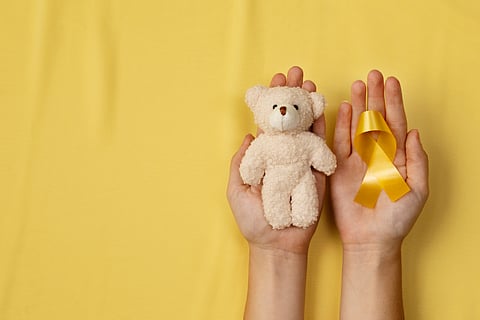

Rachel, an 11-year-old badminton player from Mauritius, was diagnosed with Philadelphia Positive Acute Lymphoblastic Leukaemia, an aggressive cancer that rapidly destroyed her health. She was referred to India for more treatment. After evaluating her case, specialists began treatment following which she was cancer-free. She did, however, relapse, and doctors performed a bone marrow transplantation followed by chemotherapy. Ten years after the transplant, she is free of illness and has been training to represent her country in the Commonwealth Games.
“Rachel’s story is one of tenacity and perseverance. She also offered us the medal she earned in one of the regional competitions as a token of her appreciation for our assistance. We proudly displayed it in our outpatient ward. Most childhood cancers, unlike adult cancers, are curable and have a high survival rate,” says Dr Ramya Uppuluri, Consultant - Paediatric Haematology Oncology, Apollo Cancer Centre, Chennai.
Although experts do not know the specific cause of childhood cancer, genetic mutation is thought to be the most common cause. Decades of research, on the other hand, has paved the path for evidence-based therapy and successful treatment protocols to reduce the burden of childhood cancer and improve outcomes.
According to the Indian Cancer Society, every year more than 50,000 new childhood cancer cases are reported in India. The most common childhood cancers are leukaemia and lymphoma, followed by brain tumours. Less common are bone tumours, neuroblastoma, and nephroblastoma.
Leukaemia: Cancer of the white blood cells that affects the blood and bone marrow.
Brain tumour: Characterised by abnormal growth of cells in the brain or the tissue and structures near it.
Neuroblastoma: A cancer that develops in the nervous system of babies and young children. It usually affects kids under the age of 5.
Wilms tumour: Wilms tumour is a kidney tumour found almost always in children. This syndrome accounts for roughly 90% of paediatric kidney tumours.
Lymphomas: Affects children’s lymphoid systems. It starts in certain cells of the immune system called lymphocytes.
Rhabdomyosarcoma: A type of soft tissue cancer that develops in cells that were intended to develop into skeletal muscle tissue.
The symptoms vary depending on the type of cancer. Children with leukaemia will have low haemoglobin and appear anaemic, with bleeding signs. A bone tumour can cause throbbing pain or swelling in the knee or any other joint in the body. Wilms tumour can be identified by an enlarged abdomen. A brain tumour can cause symptoms such as headaches, vomiting, and difficulty walking.
Dr Uppuluri says, “Children who arrive with the symptoms listed above may not have cancer. It could be a simple infection that goes away on its own. However, if parents see any red flags or symptoms that are out of the ordinary, they should seek quick medical attention.”
Depending on your child’s age, overall health, and symptoms, doctors may use a variety of tests to identify cancer. Blood tests, biopsy, CT scan, PET scan, ultrasound, and MRI are some of the methods of childhood cancer testing. The focus in treatment of childhood cancer is to improve the quality of life of children post treatment.
Experts agree that early intervention is critical in cancer care. An early diagnosis increases the child’s chances of survival and, in many cases, results in less expensive and less demanding therapy. However, lack of knowledge and myths surrounding childhood cancer impede the early diagnosis. It is imperative to raise awareness and educate communities that 70% cases of childhood cancer can be cured.
“It is natural for any parent to blame themselves. Cancer is not a genetic disease and treatments provide excellent outcome. The stigma associated with cancer needs to be broken,” adds Dr Uppuluri.
Childhood cancer treatment options include surgery, radiation, chemotherapy, or a combination of all three. It is determined by the type of cancer, the child’s age, medical problems, and potential adverse effects. Most paediatric cancer centres provide additional support services to children and their families, including child specialists, physical and occupational therapists, nutritionists, social workers, and counsellors.
Apart from the above, nutrition plays a critical role in the child’s recovery during and after treatment. Parents are encouraged to provide a nutritious, balanced, and easily digested meal prepared at home. On the other end of the scale, there is a subset of children who are malnourished. Protein powders are advised for those children in order to improve not only their weight but also their overall nutrition.
There have been major advancements in the field of paediatric oncology over the years. Experts are of the firm belief that children with cancer are best treated at paediatric cancer departments by specialised disease management groups. A separate paediatric oncology unit will be better equipped to handle the disease burden and provide appropriate treatments.
“At Apollo Cancer Centre, we hold tumour board meetings on a regular basis, which include multidisciplinary experts such as paediatric oncologists, radiation therapists, and pathologists who get together and review the case and best treatment option for the child. This is done for each child admitted to our care for them to obtain successful treatment,” Dr Uppuluri adds.
Proton treatment, which Apollo Proton Cancer Centre offers, is one of the most significant developments in radiation therapy. Proton beam treatment is particularly suited to treating paediatric cancer since it delivers more focussed radiation doses, thus minimising side effects to normal cells.
According to the Lancet Oncology Commission’s 2020 report, 80% of children drop out of treatment because of financial restrictions. This implies a significant gap in the healthcare system’s ability to adequately address this issue.
Dr Uppuluri notes that there must be a paradigm of public-private partnerships that offers a robust solution to address inequalities, boosting access to holistic healthcare across the country, and societal support to families dealing with cancer.
Dr. Ramya Uppuluri
Consultant - Paediatric Haematology Oncology
Apollo Cancer Centre, Chennai
This article was published in association with Apollo Cancer Centre.